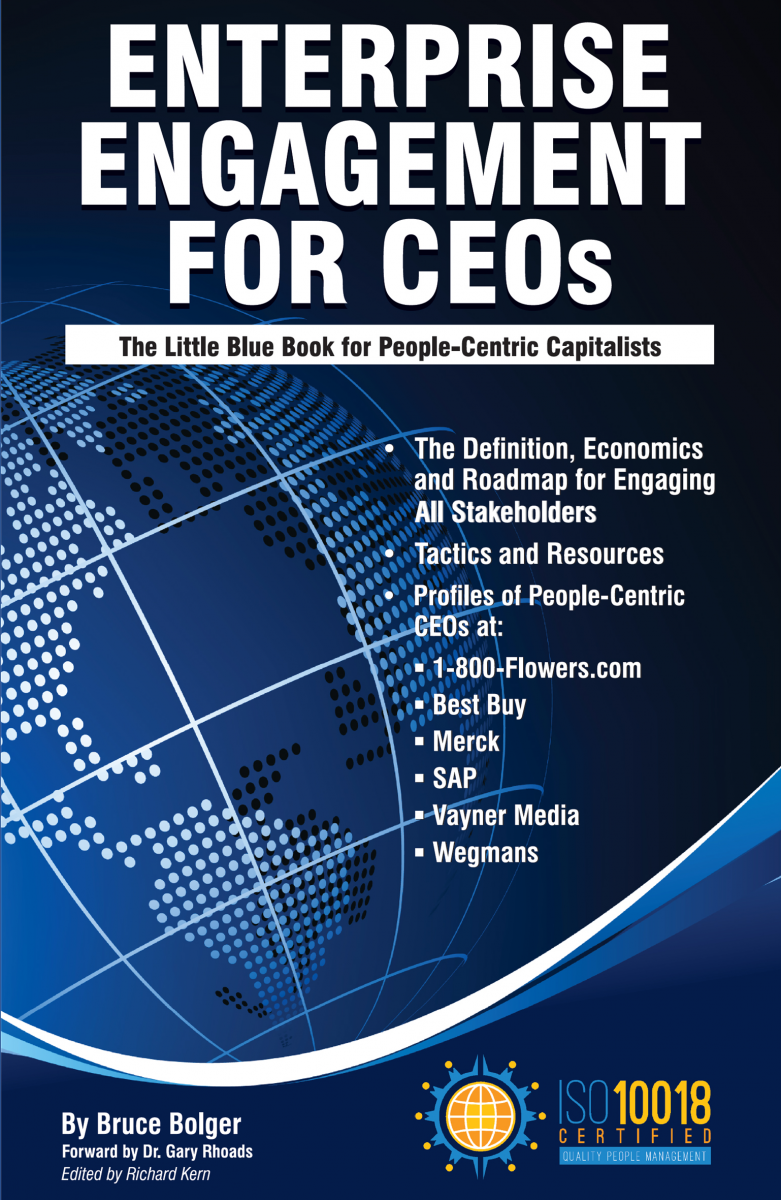For the purposes of evaluating, let alone auditing the human capital practices of organizations large and small, the International Organization for Standardization (ISO) standards can provide institutional shareholders a sensible format for disclosure of information on human capital management, including Diversity, Equity, and Inclusion (DEI) information, that is more likely to have an actual impact on organizational results. Not only have ISO standards proven their effectiveness in the world of quality management and other fields, over one million companies worldwide, including many public companies, already are accustomed to ISO procedures and audits.
By Bruce Bolger, Eric Darrisaw, and Dorien Nunez
Dorien Nunez is Founder, and
Eric Darrisaw, Senior Consultant for
OMNIResearch, a boutique investment research firm for investment firms that focuses on ESG and DEI.
Bruce Bolger is Founder of the Enterprise Engagement Alliance at
TheEEA.org and of the International Center for Enterprise Engagement at
TheICEE.org, the creators of the first certifications in ISO people management standards.

The International Organization for Standardization (ISO) human capital standards
ISO 30414 for Human Capital Management Reporting and
ISO 10018 for People Engagement provide the logical basis by which Environmental Social and Governance (ESG), including Diversity Equity Inclusion (DEI) investors, should evaluate companies. While the world’s leading advocates for more standardized sustainability reporting, including human capital, try to get their hands around the worthy task of consolidating the current frameworks of the Sustainability Accounting Standards Board, Global Reporting Initiative, the World Economic Forum’s Stakeholder Capitalism metrics, etc., public and private companies worldwide plow ahead publishing lengthy Corporate Sustainability Reports with little consistency on what information is reported and how.
When the Enterprise Engagement Alliance at
TheEEA.org first began examining human capital reporting, it became clear that anyone interested in the subject would have to invest potentially hours of time for each company. While a growing number of sustainability metrics firms provide rankings, there’s no easy way to understand the actual goals, practices, and metrics used without reading through what are often 50-plus page reports, not to mention now the sometimes difficult to find SEC 10-K disclosure human capital requirements for public companies. Even more challenging, there is little consistency between any two reports in terms of the topics covered and information provided. This is what prompted the EEA ( along with OMNIResearch and others) to create a grading system of Corporate Sustainability Reports companies can use as a model for creating or rating their own reports. See
ESM: EEA Releases First Draft Ratings on Human Capital Reporting.
Why is this important to investors? ESG (Environmental, Social, Governance) and Diversity, Equity, Inclusion (DEI) investors routinely file shareholder resolutions requesting environmental, human capital, and diversity data to evaluate an organization’s business practices. During the 2021 proxy season, shareholder advocacy groups filed over 60 diversity resolutions calling for the release of EEO-1 reports and racial equity audits at Amazon, Bank of America, Citibank, Wells Fargo, and Goldman Sachs. Most banks have rejected audits; only BlackRock has agreed to conduct an internal review. Many of these disclosure demands are being argued on racial equity grounds with the goal of having lawyers audit the practices of targeted companies.
The ISO 30414 Human Capital and ISO 10018 People Engagement standards provide a much better solution. Rather than only focusing on people practices and DEI from the standpoint of equity, they address the impact of such practices on achieving organizational goals. The objective of human capital management is to optimize performance by addressing the interests of all stakeholders—customers, employees, channel and supply chain partners, communities, etc.—drawing from the broadest community of customers, talent, and supply chain partners. Under ISO standards, Diversity, Equity, and Inclusion are baked into business practices as a means of creating even greater wealth for all stakeholders, not only as a means of addressing inequality, but by enhancing performance. The use of ISO standards by investor groups provides an opportunity to emphasize DEI as "material" to business success as defined by the Securities & Exchange Commission human capital reporting regulations.
We propose that there already exists and auditing process that is acceptable to businesses globally, and we have developed a methodology to make it relevant to ESG investors.
Companies Already Understand ISO Processes
Rather than having lawyers audit organizations, ISO provides for arms-length audits conducted by independent business experts. Moreover, organizations are already familiar with the ISO audit process: well over 1 million companies worldwide voluntarily follow ISO standards and submit their practices to an audit every three years in over 60 areas of business.
Establishing a framework for evaluating human capital reporting is designed to make it easier for both institutional investors and other stakeholders seeking information considered material to organizational success, and to make it easier for public companies, and others that make such disclosures, by providing a single reporting format that addresses most reasonable requests for information.
Deutsch Bank is the first known company to explicitly use the ISO 30414 Human Capital reporting standard as the basis for publishing its own annual human capital report. In fact, the company authorized one of its executives to participate in the development of the standard.
Of further benefit, ISO standards are designed to be audited. So, if organizations seek to go one step further and submit to having their claims verified, there exists a methodology and system by which an independent business auditor can verify the validity of the information provided in human capital reporting, i.e., the organization’s stated purpose and goals; methodologies to achieve them through all stakeholders, and the methods by which activities are measured.
No other framework we could find covers the range of topics sought by investors and all stakeholders, nor incorporates the combination of methodologies and metrics involved with auditing actual practices.
Click here for the ratings checklist your organization can use to create or benchmark your organization's human capital reporting.
A Historic Track Record of Success
The International Organization of Standardization has a long track record of success. It was created after the end of World War II to create standards to facilitate cross border transportation and trade under the Marshall Plan. It is probably best known for ISO 9001, the quality management standards that helped transform American manufacturing in the 1990s, after years of domestic quality challenges that benefited Japan and other countries that had earlier adopted total quality management practices. A key to the success of the ISO standards is the laborious, consensus-based process involving professionals from dozens of nationalities and organizations representing a diverse collection of perspectives. The
framework created for human capital by ISO 30414 and ISO 10018 speak for themselves in terms of rigor and relevance to investor and other stakeholder interests.
Organizational leaders always say people are their No. 1 asset, but few organizations manage people with the same financial discipline applied to other investment decisions. Using ISO human capital standards to evaluate human capital reporting and to audit business practices provides C-suite executives and boards of directors a proven, invaluable roadmap, benchmarking tool and review process designed to improve corporate performance. Corporations, investors, other stakeholders, the Securities & Exchange commission, European Union, and other regulators will benefit from ISO 30414 Human Capital reporting and ISO 10018 People Engagement standards, as the sincere application of ISO standards contributes to performance improvement and provides a more transparent process to enhance shareholder returns through people.
For More Information
Bruce Bolger
Founder, Enterprise Engagement Alliance
TheEEA.org
914-591-7600, ext. 230
Master the Principles of Stakeholder Capitalism And Implementation Through Enterprise Engagement
Education, Certifications, and Information to Activate
Stakeholder Capitalism Available Nowhere Else
A complete learning, certification, and information program and a course syllabus for educators.
Training and Certification
Enterprise Engagement Alliance Education: Certified Engagement Practitioner; Advanced Engaged Practitioner, and Certified Engagement Solution Provider learning and certification programs on how to implement Stakeholder Capitalism principles at the tactical level.

Join the EEA to begin your certification process or see our other resources below.
THE ONLY BOOKS ON STAKEHOLDER CAPITALISM IMPLEMENTATION

Enterprise Engagement: The Roadmap 5th Edition
The first and most comprehensive book on Enterprise Engagement and the new ISO 9001 and ISO 10018 quality people management standards. Includes 36 chapters detailing how to better integrate and align engagement efforts across the enterprise. (312 pages, $36.)
OTHER RESOURCES TO ACTUALIZE STAKEHOLDER CAPITALISM
Communities: The Enterprise Engagement Alliance and Advocate and the Brand Media Coalition free resource centers offering access to the latest research, news, and case studies; discounts, promotions, referrals, and commissions, when appropriate to third-party solution providers from participating coalition solution provider members.
Enterprise Engagement Resources: EEXAdvisors.com provides the only curated online marketplace to access hundreds of solution providers in all areas of human capital management and enterprise engagement throughout the world.
Online Overview:
10-minute short course: click here for a 10-minute introduction to Enterprise Engagement and ISO standards from the Coggno.com learning platform.
Services:
• The Engagement Agency at EngagementAgency.net, offering: complete support services for employers, solution providers, and technology firms seeking to profit from formal engagement practices for themselves or their clients, including Brand and Capability audits for solution providers to make sure their products and services are up to date.
• C-Suite Advisory Service—Education of boards, investors, and C-suite executives on the economics, framework, and implementation processes of Enterprise Engagement.
• Speakers Bureau—Select the right speaker on any aspect of engagement for your next event.
• Mergers and Acquisitions. The Engagement Agency’s Mergers and Acquisition group is aware of multiple companies seeking to purchase firms in the engagement field. Contact Michael Mazer in confidence if your company is potentially for sale at 303-320-3777.
Enterprise Engagement Benchmark Tools: The Enterprise Engagement Alliance offers three tools to help organizations profit from Engagement. Click here to access the tools.
• ROI of Engagement Calculator. Use this tool to determine the potential return-on-investment of an engagement strategy.
• EE Benchmark Indicator. Confidentially benchmark your organization’s Enterprise Engagement practices against organizations and best practices.
• Compare Your Company’s Level of Engagement. Quickly compare your organization’s level of engagement to those of others based on the same criteria as the EEA’s Engaged Company Stock Index.
• Gauge Your Personal Level of Engagement. This survey, donated by Horsepower, enables individuals to gauge their own personal levels of engagement.
For more information, contact Bruce Bolger at Bolger@TheEEA.org, 914-591-7600, ext. 230.
 The International Organization for Standardization (ISO) human capital standards ISO 30414 for Human Capital Management Reporting and ISO 10018 for People Engagement provide the logical basis by which Environmental Social and Governance (ESG), including Diversity Equity Inclusion (DEI) investors, should evaluate companies. While the world’s leading advocates for more standardized sustainability reporting, including human capital, try to get their hands around the worthy task of consolidating the current frameworks of the Sustainability Accounting Standards Board, Global Reporting Initiative, the World Economic Forum’s Stakeholder Capitalism metrics, etc., public and private companies worldwide plow ahead publishing lengthy Corporate Sustainability Reports with little consistency on what information is reported and how.
The International Organization for Standardization (ISO) human capital standards ISO 30414 for Human Capital Management Reporting and ISO 10018 for People Engagement provide the logical basis by which Environmental Social and Governance (ESG), including Diversity Equity Inclusion (DEI) investors, should evaluate companies. While the world’s leading advocates for more standardized sustainability reporting, including human capital, try to get their hands around the worthy task of consolidating the current frameworks of the Sustainability Accounting Standards Board, Global Reporting Initiative, the World Economic Forum’s Stakeholder Capitalism metrics, etc., public and private companies worldwide plow ahead publishing lengthy Corporate Sustainability Reports with little consistency on what information is reported and how. 















